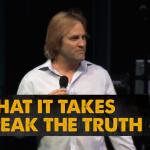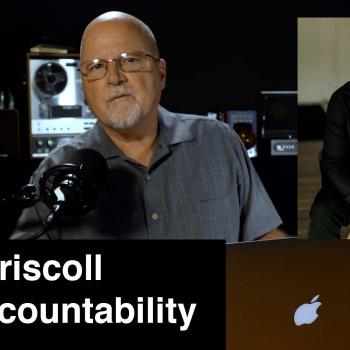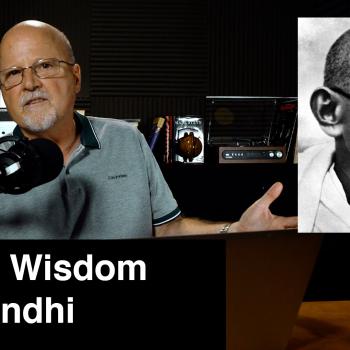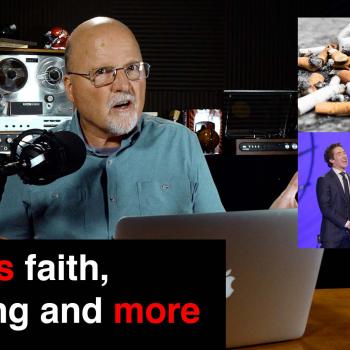It’s the young, hip, postmodern millennials, versus the old boring conservatives. Who’s going to win? I’m Joel Fieri, and it’s What You’ve Been Searching For. Stay tuned.
We’ve done some new research here at Christian Podcast Central on what you, the Christian podcast listener, have been searching for online and we’ve had some new subjects and new questions come up. And one of the subjects and questions is concerning a documentary done a couple of years ago called American Gospel: Christ Crucified. And in this documentary, it basically explores the phenomenon, about 20 years old now of the emergent church. Some of the leaders from long ago that started this movement in reaction to some of the excesses they felt of modern American evangelicalism.
It consisted of people like Bart Campolo, Rob Bell, Brian McLaren, if you’re familiar with those names. Some names I wasn’t familiar with, Richard Rohr, who’s very big in the movement that I didn’t know about. So I know about them now. In this documentary, they explore the differences in worldview and Christian view of these emergent church leaders, very postmodern, some even on the mystical new age side of things. And they contrasted it with more conservative, Orthodox evangelical pastors and theologians like John MacArthur, Alister Begg, Phil Johnson, Paul Washer, Voddie Baucham, people like that. Along with many others that I had never heard of, and I didn’t know frankly who they were.
But it was very interesting give and take. It was done in a very conversational style. It started off as fairly balanced between the arguments of the postmodern and millennial emergent pastors who are abandoning traditional Christian faith. And they’re explaining why. The most prominent one was Bart Campolo another one was Tony Jones, but there were many others, Rob Bell, Brian McLaren, as I said, and even Oprah Winfrey, if you can believe that. So these people gave their arguments as to why they either couldn’t accept a certain attribute of God as explained in the Bible, or why they had stepped away from what we would call Orthodox Christian faith.
And then there was an answer to that from the conservative evangelical side of things, the theologians and pastors would have an answer to that, or a rebuttal to that, or explain why this attribute of God is in the Bible. Anything from, “Can God be a loving God and a wrathful God? Did God actually kill his son? Did man kill his son? Is God a cosmic child abuser? Did Jesus go to the cross willingly?” All these arguments So it was very interesting. It was back and forth and very relevant. This is in my view, probably the main division and the main question and Christian circles today. What do we believe about the nature of God? Can we accept the attributes of God as the Bible lays them down? Quite frankly, these progressive millennial pastors can’t. Some of them are a little more honest about it than others.
Bart Campolo, who’s the son of Tony Campolo, if you’re familiar with Tony, a famous Christian pastor, has been since I started reading his books 40 years ago. And Bart is very honest. He has lost his faith. He is now a secular humanist. He’s a Universalist. And he’s very, very honest about it. He says, “I became a Christian, and 15 minutes later, I started doubting my faith until eventually I had to abandon my faith altogether. I don’t believe it anymore.” But yet he’s still trying to do good as his understanding of good is, which comes from the Bible. So he’s a little inconsistent with that, but he’s very honest. Some of the other ones, Tony Jones and Richard Rohr, they try at least to go back to church history, or some ancient what we would call a heresy to say, “No, this is really how we should think about God.” They’re a little fuzzy on that. They’re still trying to justify through scripture, or through church history why they feel this way.
And what you find out, or what you realize when you watch this documentary, it’s very long, it’s too long. It’s about three hours long. The main difference in approach, the main difference in worldview, the main difference both emotionally and intellectually between these two camps, becomes very evident. The progressive, emergent camp is in my view, very emotional. Their argument boils down to essentially, “I don’t like the way I’ve been taught the attributes of God. I don’t want to worship a God like that. He doesn’t fit my paradigm. He doesn’t fit my idea of what God should be. Therefore, I’m either going to remake him so I can worship him, or I’m going to abandon worshiping him altogether. I am the judge of God.”
As you might’ve guessed, the more conservative, evangelical pastors pretty much stuck to, “This is what the Bible tells us God is like. It’s very clear. This is maybe what the Greek says. This is what this passage says, versus this passage. This is the answer to that emotional argument. This is the thoughtful, Bible-based answer.” I didn’t hear one conservative evangelical leader bring himself into it, his emotions, or his experience, or what he thinks is right, or how he thinks God should be. They just went to, “This is what the Bible teaches. This is what we’ve traditionally understood God to be like. And this is what he’s like.”
Very quickly too, throughout the documentary, the conservative evangelicals took over. The filmmakers of this obviously have a more conservative bend. By the end, you pretty much figure that out. And one of the criticisms I do have of the production is that there are at least 20 people on the conservative side chiming in. And it gets to be, you lose track of who’s who and why they’re saying it and who they are and where they came from. But the conservative side is very consistent. It’s not about us. It’s about God. It’s not about what we think it should be, it’s about what the Bible tells it should be. Whereas I said on the progressive side, it’s more, “Well, this other faith tradition says this. Maybe we should consider that.” Or, “This doesn’t fit in our modern society with our modern sensibilities. It doesn’t fit the spirit of the age, therefore, we have to reject it.”
So as I said, it’s a good documentary. It’s a good introduction for anybody that’s really not clear on what the divisions are in the church and why we’re having these divisions. Actually both sides do a good job of explaining their position. And I’m obviously biased to the conservative, evangelical position, because to me, the progressive side was more, as I said, an emotional side. And they didn’t seem to be able to grasp the fact that this God who created the universe, who created us, might be a little more complex than our minds can imagine.
Whereas the conservative side realizes, we’re not God. It’s like God told Job. When Job was complaining about all the trials he was going through and complain to God, God said, “Job, where were you when I created the world? I don’t remember you being around,” basically. And again, he had to gently put Job back in his place. So, that seems to be more of the conservative idea. This isn’t about us. This is about God. Not what we can imagine, God being, but what the Bible tells us God is. The authoritative word of God.
So, I encourage you to check it out. Since I did my last review on The Chosen, I have to give this one a rating. I like the interplay between. The conversational style between it. It was far too long. They could have done it in two hours rather than three, so I’m going to give it a four out of five Bible ribbon bookmarks, which is my rating system. Anyways, thank you for listening. Next week, I want to follow up on this. Believe it or not, one of the other questions that came, the first question that came to us in our research as the top question, and it relates a little bit to this documentary, “Os Oprah a Christian?” I’ll be tackling that heavy topic, you people pick some heavy ones, next time on What You’ve Been Searching For. I’m Joel Fieri, thanks for listening.












